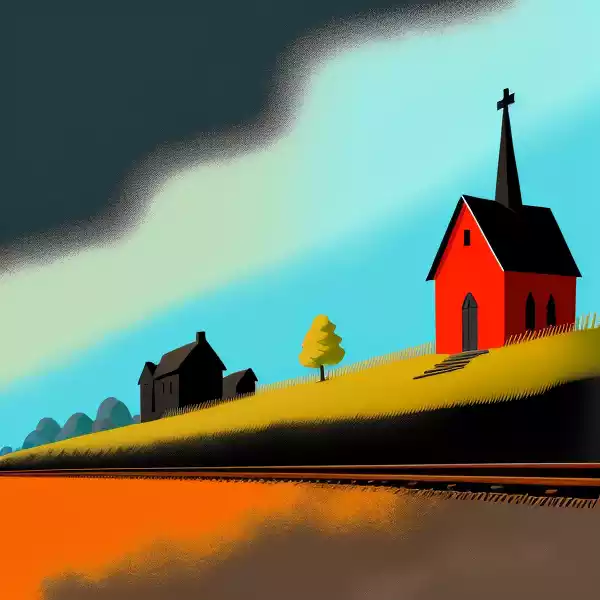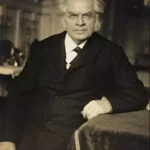 | |
The Railroad and the Churchyard | |
| Author | Bjørnstjerne Bjørnson |
|---|---|
| Published |
1866
|
| Language | English |
| Original Language | Norwegian |
| Nationality | Norwegian |
| Genre | Norwegian Literature, Poetry |
1866 Short Story
The Railroad and the Churchyard
The Railroad and the Churchyard is an English Norwegian Literature, Poetry short story by Norwegian writer Bjørnstjerne Bjørnson. It was first published in 1866.
The Railroad and the Churchyard
by Bjørnstjerne Bjørnson
I.
CANUTE AAKRE belonged to an ancient family of the parish, where it had always been distinguished for its intelligence and care for the public good. His father through self-exertion had attained to the ministry, but had died early, and his widow being by birth a peasant, the children were brought up as farmers. Consequently, Canute’s education was only of the kind afforded by the public school; but his father’s library had early inspired him with a desire for knowledge, which was increased by association with his friend Henrik Wergeland, who often visited him or sent him books, seeds for his farm, and much good counsel. Agreeably to his advice, Canute early got up a club for practice in debating and study of the constitution, but which finally became a practical agricultural society, for this and the surrounding parishes. He also established a parish library, giving his father’s books as its first endowment, and organized in his own house a Sunday-school for persons wishing to learn penmanship, arithmetic, and history. In this way the attention of the public was fixed upon him, and he was chosen a member of the board of parish-commissioners, of which he soon became chairman. Here he continued his endeavors to advance the school interests, which he succeeded in placing in an admirable condition.
Canute Aakre was a short-built, active man, with small sharp eyes and disorderly hair. He had large lips which seemed constantly working, and a row of excellent teeth which had the same appearance, for they shone when he spoke his clear sharp words, which came out with a snap, as when the sparks are emitted from a great fire.
Among the many he had helped to an education, his neighbor Lars Hogstad stood foremost. Lars was not much younger than Canute, but had developed more slowly. Being in the habit of talking much of what he read and thought, Canute found in Larswho bore a quiet, earnest mannera good listener, and step by step a sensible judge. The result was, that he went reluctantly to the meetings of the board, unless first furnished with Lars Hogstad’s advice, concerning whatever matter of importance was before it, which matter was thus most likely to result in practical improvement. Canute’s influence, therefore, brought his neighbor in as a member of the board, and finally into everything with which he himself was connected. They always rode together to the meetings, where Lars never spoke, and only on the road to and from, could Canute learn his opinion. They were looked upon as inseparable.
One fine autumn day, the parish-commissioners were convened, for the purpose of considering, among other matters, a proposal made by the Foged, to sell the public grain-magazine, and with the proceeds establish a savings-bank. Canute Aakre, the chairman, would certainly have approved this, had he been guided by his better judgment; but, in the first place, the motion was made by the Foged, whom Wergeland did not like, consequently, neither did Canute; secondly, the grain-magazine had been erected by his powerful paternal grandfather, by whom it was presented to the parish. To him the proposal was not free from an appearance of personal offence; therefore, he had not spoken of it to any one, not even to Lars, who never himself introduced a subject.
As chairman, Canute read the proposal without comment, but, according to his habit, looked over to Lars, who sat as usual a little to one side, holding a straw between his teeth; this he always did when entering upon a subject, using it as he would a toothpick, letting it hang loosely in one corner of his mouth, or turning it more quickly or slowly, according to the humor he was in. Canute now saw with surprise, that the straw moved very fast. He asked quickly, “Do you think we ought to agree to this?”
Lars answered dryly, “Yes, I do.”
The whole assembly, feeling that Canute was of quite a different opinion, seemed struck, and looked at Lars, who said nothing further, nor was further questioned. Canute turned to another subject, as if nothing had happened, and did not again resume the question till toward the close of the meeting, when he asked with an air of indifference if they should send it back to the Foged for closer consideration, as it certainly was contrary to the mind of the people of the parish, by whom the grain-magazine was highly valued; also, if he should put upon the record, “Proposal deemed inexpedient.”
“Against one vote,” said Lars.
“Against two,” said another instantly.
“Against three,” said a third, and before the chairman had recovered from his surprise, a majority had declared in favor of the proposal.
He wrote; then read in a low tone, “Referred for acceptance, and the meeting adjourned.” Canute, rising and closing the “Records,” blushed deeply, but resolved to have this vote defeated in the parish meeting. In the yard he hitched his horse to the wagon, and Lars came and seated himself by his side. On the way home they spoke upon various subjects, but not upon this.
On the following day Canute’s wife started for Lars’ house, to inquire of his wife if anything had happened between their husbands; Canute had appeared so queerly when he returned home the evening previous. A little beyond the house she met Lars’ wife, who came to make the same inquiry on account of a similar peculiar behavior in her husband. Lars’ wife was a quiet, timid thing, easily frightened, not by hard words, but by silence; for Lars never spoke to her unless she had done wrong, or he feared she would do so. On the contrary, Canute Aakre’s wife spoke much with her husband, and particularly about the commissioners’ meetings, for lately they had taken his thoughts, work, and love from her and the children. She was jealous of it as of a woman, she wept at night about it, and quarrelled with her husband concerning it in the day. But now she could say nothing; for once he had returned home unhappy; she immediately became much more so than he, and for the life of her she must know what was the matter. So as Lars’ wife could tell her nothing, she had to go for information out in the parish, where she obtained it, and of course was instantly of her husband’s opinion, thinking Lars incomprehensible, not to say bad. But when she let her husband perceive this, she felt that, notwithstanding what had occurred, no friendship was broken between them; on the contrary, that he liked Lars very much.
The day for the parish meeting came. In the morning, Lars Hogstad drove over for Canute Aakre, who came out and took a seat beside him. They saluted each other as usual, spoke a little less than they were wont on the way, but not at all of the proposal. The meeting was full; some, too, had come in as spectators, which Canute did not like, for he perceived by this a little excitement in the parish. Lars had his straw, and stood by the stove, warming himself, for the autumn had begun to be cold. The chairman read the proposal in a subdued and careful manner, adding, that it came from the Foged, who was not habitually fortunate. The building was a gift, and such things it was not customary to part with, least of all when there was no necessity for it.
Lars, who never before had spoken in the meetings, to the surprise of all, took the floor. His voice trembled; whether this was caused by regard for Canute, or anxiety for the success of the bill, we cannot say; but his arguments were clear, good, and of such a comprehensive and compact character as had hardly before been heard in these meetings. In concluding, he said:
“Of what importance is it that the proposal is from the Foged?none,or who it was that erected the house, or in what way it became the public property?”
Canute, who blushed easily, turned very red, and moved nervously as usual when he was impatient; but notwithstanding, he answered in a low, careful tone, that there were savings banks enough in the country, he thought, quite near, and almost too near. But if one was to be instituted, there were other ways of attaining this end, than by trampling upon the gifts of the dead, and the love of the living. His voice was a little unsteady when he said this, but recovered its composure, when he began to speak of the grain magazine as such, and reason concerning its utility.
Lars answered him ably on this last, adding: “Besides, for many reasons I would be led to doubt whether the affairs of this parish are to be conducted for the best interests of the living, or for the memory of the dead; or further, whether it is the love and hate of a single family which rules, rather than the welfare of the whole.”
Canute answered quickly: “I don’t know whether the last speaker has been the one least benefited not only by the dead of this family, but also by its still living representative.”
In this remark he aimed first at the fact that his powerful grandfather had, in his day, managed the farm for Lars’ grandfather, when the latter, on his own account, was on a little visit to the penitentiary.
The straw, which had been moving quickly for a long time, was now still:
“I am not in the habit of speaking everywhere of myself and family,” said he, treating the matter with calm superiority; then he reviewed the whole matter in question, aiming throughout at a particular point. Canute was forced to acknowledge to himself, that he had never looked upon it from that standpoint, or heard such reasoning; involuntarily he had to turn his eye upon Lars. There he stood tall and portly, with clearness marked upon the strongly-built forehead and in the deep eyes. His mouth was compressed, the straw still hung playing in its corner, but great strength lay around. He kept his hands behind him, standing erect, while his low deep intonations seemed as if from the ground in which he was rooted. Canute saw him for the first time in his life, and from his inmost soul felt a dread of him; for unmistakably this man had always been his superior! He had taken all Canute himself knew or could impart, but retained only what had nourished this strong hidden growth.
He had loved and cherished Lars, but now that he had become a giant, he hated him deeply, fearfully; he could not explain to himself why he thought so, but he felt it instinctively, while gazing upon him; and in this forgetting all else, he exclaimed:
“But Lars! Lars! what in the Lord’s name ails you?”
He lost all self-control,”you, whom I have””you, who have”he could n’t get out another word, and seated himself, only to struggle against the excitement which he was unwilling to have Lars see; he drew himself up, struck the table with his fist, and his eyes snapped from below the stiff disorderly hair which always shaded them. Lars appeared as if he had not been interrupted, only turning his head to the assembly, asking if this should be considered the decisive blow in the matter, for in such a case nothing more need be said.
Canute could not endure this calmness.
“What is it that has come among us?” he cried. “Us, who to this day have never debated but in love and upright zeal? We are infuriated at each other as if incited by an evil spirit;” and he looked with fiery eyes upon Lars, who answered:
“You yourself surely bring in this spirit, Canute, for I have spoken only of the case. But you will look upon it only through your own self-will; now we shall see if your love and upright zeal will endure, when once it is decided agreeably to our wish.”
“Have I not, then, taken good care of the interests of the parish?”
No reply. This grieved Canute, and he continued:
“Really, I did not think otherwise than that I had accomplished something;something for the good of the parish;but may be I have deceived myself.”
He became excited again, for it was a fiery spirit within him, which was broken in many ways, and the parting with Lars grieved him, so he could hardly control himself. Lars answered:
“Yes, I know you give yourself the credit for all that is done here, and should one judge by much speaking in the meetings, then surely you have accomplished the most.
“Oh, is it this!” shouted Canute, looking sharply upon Lars: “it is you who have the honor of it!”
“Since we necessarily talk of ourselves,” replied Lars, “I will say that all matters have been carefully considered by us before they were introduced here.”
Here little Canute Aakre resumed his quick way of speaking:
“In God’s name take the honor, I am content to live without it; there are other things harder to lose!”
Involuntarily Lars turned his eye from Canute, but said, the straw moving very quickly: “If I were to speak my mind, I should say there is not much to take honor for;of course ministers and teachers may be satisfied with what has been done; but, certainly, the common men say only that up to this time the taxes have become heavier and heavier.”
A murmur arose in the assembly, which now became restless. Lars continued:
“Finally, to-day, a proposition is made which, if carried, would recompense the parish for all it has laid out; perhaps, for this reason, it meets such opposition. It is the affair of the parish, for the benefit of all its inhabitants, and ought to be rescued from being a family matter.”
The audience exchanged glances, and spoke half audibly, when one threw out a remark as he rose to go to his dinner-pail, that these were “the truest words he had heard in the meetings for many years.” Now all arose, and the conversation became general. Canute Aakre felt as he sat there that the case was lost, fearfully lost; and tried no more to save it. He had somewhat of the character attributed to Frenchmen, in that he was good for first, second, and third attacks, but poor for self-defencehis sensibilities overpowering his thoughts.
He could not comprehend it, nor could he sit quietly any longer; so, yielding his place to the vice-chairman, he left,and the audience smiled.
He had come to the meeting accompanied by Lars, but returned home alone, though the road was long. It was a cold autumn day; the way looked jagged and bare, the meadow gray and yellow; while frost had begun to appear here and there on the roadside. Disappointment is a dreadful companion. He felt himself so small and desolate, walking there; but Lars was everywhere before him, like a giant, his head towering, in the dusk of evening, to the sky. It was his own fault that this had been the decisive battle, and the thought grieved him sorely: he had staked too much upon a single little affair. But surprise, pain, anger, had mastered him; his heart still burned, shrieked, and moaned within him. He heard the rattling of a wagon behind; it was Lars, who came driving his superb horse past him at a brisk trot, so that the hard road gave a sound of thunder. Canute gazed after him, as he sat there so broad-shouldered in the wagon, while the horse, impatient for home, hurried on unurged by Lars, who only gave loose rein. It was a picture of his power; this man drove toward the mark! He, Canute, felt as if thrown out of his wagon to stagger along there in the autumn cold.
Canute’s wife was waiting for him at home. She knew there would be a battle; she had never in her life believed in Lars, and lately had felt a dread of him. It had been no comfort to her that they had ridden away together, nor would it have comforted her if they had returned in the same way. But darkness had fallen, and they had not yet come. She stood in the doorway, went down the road and home again; but no wagon appeared. At last she hears a rattling on the road, her heart beats as violently as the wheels revolve; she clings to the doorpost, looking out; the wagon is coming; only one sits there; she recognizes Lars, who sees and recognizes her, but is driving past without stopping. Now she is thoroughly alarmed! Her limbs fail her; she staggers in, sinking on the bench by the window. The children, alarmed, gather around, the youngest asking for papa, for the mother never spoke with them but of him. She loved him because he had such a good heart, and now this good heart was not with them; but, on the contrary, away on all kinds of business, which brought him only unhappiness; consequently, they were unhappy too.
“Oh, that no harm had come to him to-day! Canute was so excitable! Why did Lars come home alone? why did n’t he stop?”
Should she run after him, or, in the opposite direction, toward her husband? She felt faint, and the children pressed around her, asking what was the matter; but this could not be told to them, so she said they must take supper alone, and, rising, arranged it and helped them. She was constantly glancing out upon the road. He did not come. She undressed and put them to bed, and the youngest repeated the evening prayer, while she bowed over him, praying so fervently in the words which the tiny mouth first uttered, that she did not perceive the steps outside.
Canute stood in the doorway, gazing upon his little congregation at prayer. She rose; all the children shouted ” Papa!” but he seated himself, and said gently:
“Oh! let him repeat it.”
The mother turned again to the bedside, that meantime he might not see her face; otherwise, it would have been like intermeddling with his grief before he felt a necessity of revealing it. The child folded its hands,the rest followed the example,and it said:
What a peace now fell! Not a minute more had passed ere the children all slept in it as in the lap of God; but the mother went quietly to work arranging supper for the father, who as yet could not eat. But after he had gone to bed, he said:
“Now, after this, I shall be at home.”
The mother lay there, trembling with joy, not daring to speak, lest she should reveal it; and she thanked God for all that had happened, for, whatever it was, it had resulted in good.
II.
In the course of a year, Lars was chosen head Justice of the Peace, chairman of the board of commissioners, president of the savings-bank, and, in short, was placed in every office of parish trust to which his election was possible. In the county legislature, during the first year, he remained silent, but afterward made himself as conspicuous as in the parish council; for here, too, stepping up to the contest with him who had always borne sway, he was victorious over the whole line, and afterward himself manager. From this he was elected to the Congress, where his fame had preceded him, and he found no lack of challenge. But here, although steady and independent, he was always retiring, never venturing beyond his depth, lest his post as leader at home should be endangered by a possible defeat abroad.
It was pleasant to him now in his own town. When he stood by the church-wall on Sundays, and the community glided past, saluting and glancing sideways at him,now and then one stepping up for the honor of exchanging a couple of words with him,it could almost be said that, standing there, he controlled the whole parish with a straw, which, of course, hung in the cor- ner of his mouth.
He deserved his popularity; for he had opened a new road which led to the church; all this and much more resulted from the savings-bank, which he had instituted and now managed; and the parish, in its self-management and good order, was held up as an example to all others.
Canute, of his own accord, quite withdrew,not entirely at first, for he had promised himself not thus to yield to pride. In the first proposal he made before the parish board, he became en- tangled by Lars, who would have it represented in all its details; and, somewhat hurt, he re- plied: “When Columbus discovered America he did not have it divided into counties and towns,this came by degrees afterward;” upon which, Lars compared Canute’s proposition (relating to stable improvements) to the discovery of America, and afterward by the commissioners he was called by no other name than “Discovery of America.” Canute thought since his influence had ceased there, so, also, had his duty to work; and afterwards declined re-election.
But be was industrious, and, in order still to do something for the public good, he enlarged his Sunday-school, and put it, by means of small contributions from the pupils, in connection with the mission cause, of which he soon became the centre and leader in his own and surrounding counties. At this, Lars remarked that, if Canute ever wished to collect money for any purpose, he must first know that its benefit was only to be realized some thousands of miles away.
There was no strife between them now. True, they associated with each other no longer, but saluted and exchanged a few words whenever they met. Canute always felt a little pain in remembering Lars, but struggled to overcome it, by saying to himself that it must have been so. Many years afterward at a large wedding-party, where both were present and a little gay, Canute stepped upon a chair and proposed a toast to the chairman of the parish council, and the county’s first congressman. He spoke until he manifested emotion, and, as usual, in an exceedingly handsome way. It was honorably done, and Lars came to him, saying, with an unsteady eye, that for much of what he knew and was, he had to thank him.
At the next election, Canute was again elected chairman.
But if Lars Hogstad had foreseen what was to follow, he would not have influenced this. It is a saying that “all events happen in their time,” and just as Canute appeared again in the council, the ablest men in the parish were threatened with bankruptcy, the result of a speculative fever which had been raging long, but now first began to react. They said that Lars Hogstad had caused this great epidemic, for it was he who had brought the spirit of speculation into the parish. This penny malady had originated in the parish board; for this body itself had acted as leading speculator. Down to the youth of twenty years, all were endeavoring by sharp bargains to make the one dollar, ten; extreme parsimony, in order to lay up in the beginning, was followed by an exceeding lavishness in the end: and as the thoughts of all were directed to money only, a disposition to selfishness, suspicion, and disunion had developed itself, which at last turned to prosecutions and hatred. It was said that the parish board had set the example in this also; for one of the first acts, performed by Lars as chairman, was a prosecution against the minister, concerning doubtful prerogatives. The venerable pastor had lost, but had also immediately resigned. At the time some had praised, others denounced, this act of Lars; but it had proved a bad example. Now came the effects of his management in the form of loss to all the leading men of the parish; and consequently, the public opinion quickly changed. The opposite party immediately found a champion; for Canute Aakre had come into the parish board,introduced there by Lars himself.
The struggle at once began. All those youths, who, in their time, had been under Canute Aakre’s instruction, were now grown-up men, the best educated, conversant with all the business and public transactions in the parish; Lars had now to contend against these and others like them, who had disliked him from their childhood. One evening after a stormy debate, as he stood on the platform outside his door, looking over the parish, a sound of distant threatening thunder came toward him from the large farms, lying in the storm. He knew that that day their owners had become insolvent, that he himself and the savings-bank were going the same way: and his whole long work would culminate in condemnation against him.
In these days of struggle and despair, a company of surveyors came one evening to Hogstad, which was the first farm at the entrance of the parish to mark out the line of a new railroad. In the course of conversation, Lars perceived it was still a question with them whether the road should run through this valley, or another parallel one.
Like a flash of lightning it darted through his mind, that, if he could manage to get it through here, all real estate would rise in value, and not only he himself be saved, but his popularity handed down to future generations. He could not sleep that night, for his eyes were dazzled with visions; sometimes he seemed to hear the noise of an engine. The next day he accompanied the surveyors in their examination of the locality; his horses carried them, and to his farm they returned. The following day they drove through the other valley, he still with them, and again carrying them back home. The whole house was illuminated, the first men of the parish having been invited to a party made for the surveyors, which terminated in a carouse that lasted until morning. But to no avail; for the nearer they came to the decision, the clearer it was to be seen that the road could not be built through here without great extra expense. The entrance to the valley was narrow, through a rocky chasm, and the moment it swung into the parish the river made a curve in its way, so that the road would either have to make the samecrossing the river twiceor go straight forward through the old, now unused, churchyard. But it was not long since the last burials there, for the church had been but recently moved.
Did it only depend upon a strip of an old churchyard, thought Lars, whether the parish should have this great blessing or not?then he would use his name and energy for the removal of the obstacle. So immediately he made a visit to minister and bishop, from them to county legislature and Department of the Interior; he reasoned and negotiated; for he had possessed himself of all possible information concerning the vast profits that would accrue on the one side, and the feelings of the parish on the other, and had really succeeded in gaining over all parties. It was promised him that by the reinterment of some bodies in the new churchyard, the only objection to this line might be considered as removed, and the king’s approbation guaranteed. It was told him that he need only make the motion in the county meeting.
The parish had become as excited on the question as himself. The spirit of speculation, which had been prevalent so many years, now became jubilant. No one spoke or thought of anything but Lars’ journey and its probable result. Consequently, when he returned with the most splendid promises, they made much ado about him; songs were sung to his praise,yes, if at that time one after another of the largest farms had toppled over, not a soul would have given it any attention; the former speculation fever had been succeeded by the new one of the railroad.
The county board met; an humble petition that the old churchyard might be used for the railroad was drawn up to be presented to the king. This was unanimously voted; yes, there was even talk of voting thanks to Lars, and a gift of a coffee-pot, in the model of a locomotive. But finally, it was thought best to wait until everything was accomplished. The petition from the parish to the county board was sent back, with a requirement of a list of the names of all bodies which must necessarily be removed. The minister made out this, but instead of sending it directly to the county board, had his reasons for communicating it first to the parish. One of the members brought it to the next meeting. Here, Lars opened the envelope, and as chairman read the names.
Now it happened that the first body to be removed was that of Lars’ own grandfather. A little shudder passed through the assembly; Lars himself was taken by surprise; but continued. Secondly, came the name of Canute Aakre’s grandfather; for the two had died at nearly the same time. Canute Aakre sprang from his seat; Lars stopped; all looked up with dread; for the name of the elder Canute Aakre had been the one most beloved in the parish for generations. There was a pause of some minutes. At last Lars hemmed, and continued. But the matter became worse, for the further he proceeded, the nearer it approached their own day, and the dearer the dead became. When he ceased, Canute Aakre asked quietly if others did not think as he, that spirits were around them. It had begun to grow dusk in the room, and although they were mature men sitting in company, they almost felt themselves frightened. Lars took a bundle of matches from his pocket and lit a candle, somewhat dryly remarking that this was no more than they had known beforehand.
“No,” replied Canute, pacing the floor, “this is more than I knew beforehand. Now I begin to think that even railroads can be bought too dearly.”
This electrified the audience, and Canute continued that the whole affair must be reconsidered, and made a motion to that effect. In the excitement which had prevailed, he said it was also true that the benefit to be derived from the road had been considerably overrated; for if it did not pass through the parish, there would have to be a depot at each extremity; true, it would be a little more trouble to drive there, than to a station within; yet not so great as that for this reason they should dishonor the rest of the dead. Canute was one of those who, when his thoughts were excited, could extemporize and present most sound reasons; he had not a moment previously thought of what he now said; but the truth of it struck all. Lars, seeing the danger of his position, thought best to be careful, and so apparently acquiesced in Canute’s proposition to reconsider; for such emotions, thought he, are always strongest in the beginning; one must temporize with them.
But here he had miscalculated. In constantly increasing waves the dread of touching their dead overswept the parish; what no one had thought of as long as the matter existed only in talk became a serious question when it came to touch themselves. The women particularly were excited, and at the parish house, on the day of the next meeting, the road was black with the gathered multitude. It was a warm summer day, the windows were taken out, and as many stood without as within. All felt that that day would witness a great battle.
Lars came, driving his handsome horse, saluted by all; he looked quietly and confidently around, not seeming surprised at the throng. He seated himself, straw in mouth, near the window, and not without a smile saw Canute rise to speak, as he thought, for all the dead lying over there in the old churchyard.
But Canute Aakre did not begin with the churchyard. He made a stricter investigation into the profits likely to accrue from carrying the road through the parish, showing that in all this excitement they had been over-estimated. He had calculated the distance of each farm from the nearest station, should the road be taken through the neighboring valley, and finally asked:
“Why has such a hurrah been made about this railroad, when it would not be for the good of the parish after all?”
This he could explain; there were those who had brought about such a previous disturbance, that a greater was necessary in order that the first might be forgotten. Then, too, there were those who, while the thing was new, could sell their farms and lands to strangers, foolish enough to buy; it was a shameful speculation, which not the living only but the dead also must be made to promote!
The effect produced by his address was very considerable. But Lars had firmly resolved, come what would, to keep cool, and smilingly replied that he supposed Canute Aakre himself had been anxious for the railroad, and surely no one would accuse him of understanding speculation. (A little laugh ensued.) Canute had had no objection to the removal of bodies of common people for the sake of the railroad, but when it came to that of his own grandfather, the question became suddenly of vital importance to the whole parish. He said no more, but looked smilingly at Canute, as did also several others. Meanwhile, Canute Aakre surprised both him and them by replying:
“I confess it; I did not realize what was at stake until it touched my own dead; possibly this is a shame, but really it would have been a greater one not even then to have realized it, as is the case with Lars! Never, I think, could Lars’ raillery have be







